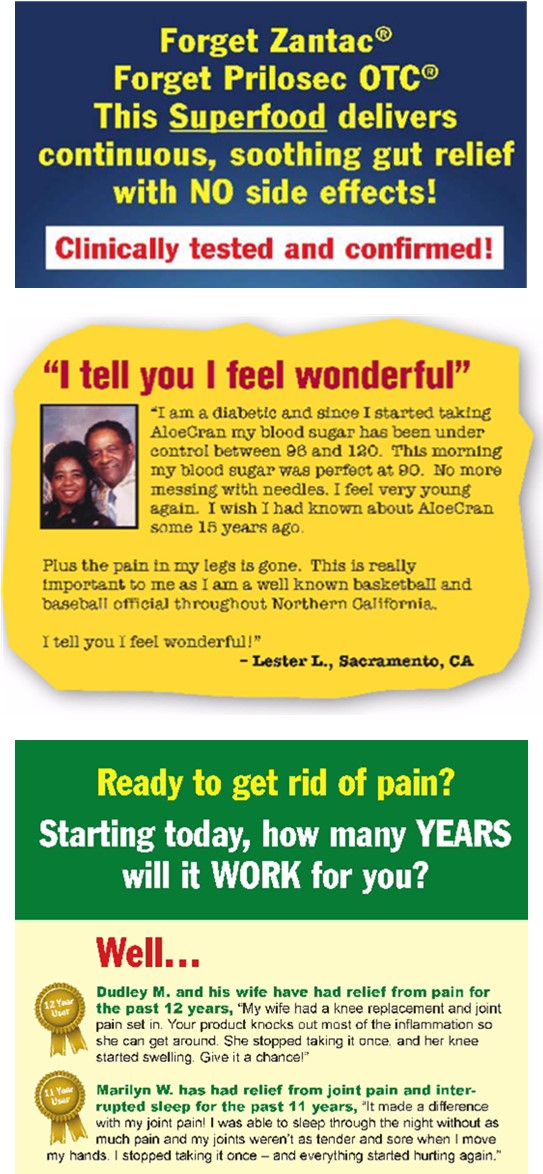Aloe and cranberry: a useful plant and a nutritious fruit. But are they clinically proven alone or in combination to treat diabetes, ulcerative colitis, high cholesterol, and a list of other serious medical conditions that afflict Boomer Consumers? According to the FTC, those are just some of the deceptive claims that Florida-based NatureCity, LLC, made for TrueAloe capsules and AloeCran powdered drink mix.
Online and through direct mail, NatureCity touted TrueAloe as a proven treatment. Ads emphasized the product’s purported benefits for people with diabetes: “Aloe worked even when blood sugar medicine didn’t” and “protect your heart and body from deadly diabetes with 5 natural phytosterols….” According to another ad, “In a randomized, double-blind, placebo-controlled trial, 44 people suffering from ulcerative colitis (a type of irritable bowel) were given Aloe vera or a placebo….in just 4 weeks 47% of the lucky folks taking Aloe had a complete remission or improvement in their condition…with NO SIDE EFFECTS.” Another ad touted TrueAloe’s “amazing ability to erase inflammation, joint and muscle pain and restore youthful movement and freedom….”
The complaint alleges NatureCity made similar good-for-what-ails-you claims for drink mix AloeCran: “Boost[s] ‘good’ HDL cholesterol” and “[b]oost[s] absorption of key vitamins.” In addition, NatureCity claimed clinical proof for AloeCran’s benefits. According to one ad, “polysaccharides don’t just help your stomach, they also may benefit irritable bowels. This was shown in a study…of people with mild to moderate ulcerative colitis (a type of irritable bowels).”
 In addition, the FTC says the defendants pitched their products as comparable or superior to conventional medical treatments for diabetes, acid reflux, ulcers, and joint pain. NatureCity conveyed those claims through purported scientific proof and glowing consumer testimonials. For example, ads for TrueAloe stated, “Aloe worked even when blood sugar medicine didn’t!,” “I was able to quit taking my acid reflux medication!” and “The researchers found that Aloe was just as effective as a commonly used anti-ulcer drug (a proton pump inhibitor) with one major difference…[.] No toxic side effects!”
In addition, the FTC says the defendants pitched their products as comparable or superior to conventional medical treatments for diabetes, acid reflux, ulcers, and joint pain. NatureCity conveyed those claims through purported scientific proof and glowing consumer testimonials. For example, ads for TrueAloe stated, “Aloe worked even when blood sugar medicine didn’t!,” “I was able to quit taking my acid reflux medication!” and “The researchers found that Aloe was just as effective as a commonly used anti-ulcer drug (a proton pump inhibitor) with one major difference…[.] No toxic side effects!”
The company made similarly dramatic representations for AloeCran: “I am a diabetic and since I started taking AloeCran[,] my blood sugar has been under control between 96 and 120….No more messing with needles.” Another consumer claimed, “No more discomfort and no side effects! I had severe acid reflux and could not eat my favorite foods without digestive problems. I did not want to take acid blockers with all the side effects which I heard could cause long-term damage after a while. I now drink a glass of AloeCran every morning and an AloeCran ‘cocktail’ before dinner….I can now eat and drink anything I like with no problems.”
Those are just a few of the claims NatureCity made for TrueAloe and AloeCran – representations the FTC has challenged as deceptive. What about the company’s assurance that many of the purported health benefits of the products had been clinically or scientifically proven? The complaint alleges those claims were false.
The lawsuit also charges that NatureCity offered undisclosed incentives or other compensation to some of the endorsers featured in the company’s promotional materials.
Under the terms of the settlement, NatureCity and corporate officers Carl Pradelli and Beth Pradelli will need human clinical testing before making a host of serious medical claims. The order also imposes broad fencing-in relief to protect consumers in the future from misleading representations about the health benefits, performance, efficacy, safety, or side effects of any dietary supplement, food, or drug. In addition, the defendants will have to clearly disclose any material connection with anyone providing an endorsement and they must notify customers individually about the FTC’s lawsuit. The order includes an $18.6 million financial remedy that will be partially suspended when the defendants turn over $537,500. The order also has court-enforceable provisions if it turns out the defendants made any material misstatement or omission in their financial documents.
The message for other companies isn’t new, but it’s one that sellers of health-related products need to hear again. As Boomer Consumers age, they’re looking for solutions to often intractable medical problems. Don’t position your product as an effective treatment unless you have solid science to support what you say. Depending on the claim, that may mean randomized clinical testing. And for marketers in any sector, prospective customers have a right to know about incentives or compensation that consumer endorsers have received.
